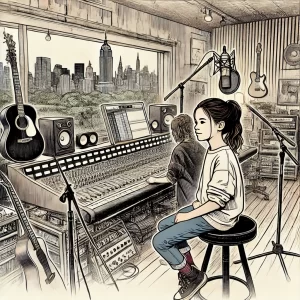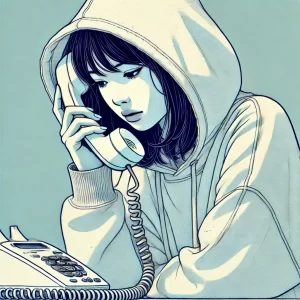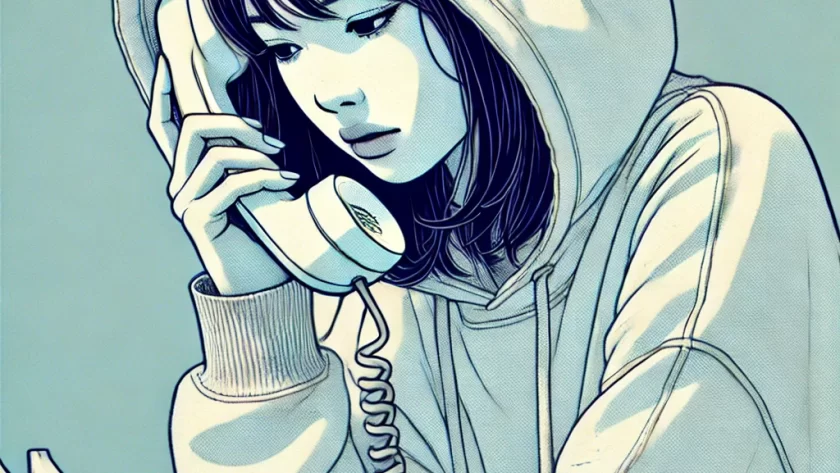Automatic [Automatic]
宇多田ヒカル [Utada Hikaru]
Words & Music : 宇多田ヒカル [Utada Hikaru]
Hikaru Utada was born in 1983. Her father is a music producer, and her mother is the famous enka singer Keiko Fuji. She frequently traveled between Tokyo and New York from a young age and lived a life centered around music. She debuted at the age of 15 in 1998, releasing this first single “Automatic.” With support from radio stations and the buzz of a 15-year-old returnee being the daughter of Keiko Fuji, she quickly gained explosive popularity.

I am the same age as Hikaru Utada, and when she made her sensational debut at the age of 15, it was a hot topic among my friends. What I remember most is that her singing style was completely different from previous Japanese singers. Even though the lyrics were in Japanese, her pronunciation was like that of an American R&B singer, which was very distinctive, and there were no singers like that at the time. Her influence led to an increase in singers who sang in that style. Nowadays, many singers use that style. I think even FUJII Kaze is the same.
七回目のベルで受話器を取った君
nana kaime no beru de juwaki o totta kimi
名前を言わなくても声ですぐ分かってくれる
namae o iwanakute mo koe de sugu wakatte kureru
- 七回目(ななかいめ) [nana kaime] : seventh time
- ベル [beru] : bell
- 受話器(じゅわき) [juwaki] : receiver
- 君(きみ) [kimi] : you
- 名前(なまえ) [namae] : name
- 言う(いう) [iu] : say
- 声(こえ) [koe] : voice
- すぐ [sugu] : immediately
- わかる(わかる) [wakaru] : understand
- くれる [kureru] : give (used here as a favor)
(translation) “At the seventh ring, you picked up the receiver.
Even without saying your name, I knew immediately by your voice.”
It goes without saying, but it’s
“brrring….brrring….brrring….brrring….brrring…..brrring….brrring”
for seven times. In Japanese, we say “プルルルル / pururururu.”
This was before mobile phones became widespread. Do you get it? Before you pick up the receiver, you don’t know who is calling. In my memory, mobile phones became quite common about a year after this.

唇から自然とこぼれ落ちるメロディー
kuchibiru kara shizen to koboreochiru merodī
でも言葉を失った瞬間が 一番幸せ
demo kotoba o ushinatta shunkan ga ichiban shiawase
- 唇(くちびる) [kuchibiru] : lips
- 自然と(しぜんと) [shizen to] : naturally
- こぼれ落ちる(こぼれおちる) [koboreochiru] : spill out
- メロディー [merodī] : melody
- 言葉(ことば) [kotoba] : words
- 失う(うしなう) [ushinau] : lose
- 瞬間(しゅんかん) [shunkan] : moment
- 一番(いちばん) [ichiban] : most
- 幸せ(しあわせ) [shiawase] : happiness
(translation) “A melody naturally spills from my lips,
but the moment I lose my words is the happiest.”
嫌なことがあった日も
iyana koto ga atta hi mo
君に会うと全部フッ飛んじゃうよ
kimi ni au to zenbu futtonjau yo
君に会えない my rainy days
kimi ni aenai my rainy days
声を聞けば自動的に sun will shine
koe o kikeba jidōteki ni sun will shine
- 嫌な(いやな) [iyana] : unpleasant
- こと [koto] : thing
- ある [aru] : exist
- 日(ひ) [hi] : day
- 君(きみ) [kimi] : you
- 会う(あう) [au] : meet
- 全部(ぜんぶ) [zenbu] : everything
- 吹っ飛ぶ(ふっとぶ) [futtobu] : blow away
- 声(こえ) [koe] : voice
- 聞く(きく) [kiku] : hear
- 自動的に(じどうてきに) [jidōteki ni] : automatically
(translation) “Even on days when unpleasant things happen,
when I meet you, everything blows away.
On my rainy days when I can’t meet you,
just hearing your voice automatically makes the sun shine.”
Using “君 / kimi,” which typically refers to females as the second person, somehow reflects her personality.
It’s automatic
側にいるだけで その目に見つめられるだけで
soba ni iru dake de sono me ni mitsumerareru dake de
ドキドキ止まらない Noとは言えない
dokidoki tomaranai No to wa ienai
I just can’t help
- そばに [soba ni] : beside
- いる [iru] : be
- だけ [dake] : just
- 目(め) [me] : eyes
- 見つめる(みつめる) [mitsumeru] : stare
- ドキドキ [dokidoki] : heartbeat (onomatopoeia)
- 止まる(とまる) [tomaru] : stop
- 言う(いう) [iu] : say
(translation) “It’s automatic. Just being beside you, just being stared at by those eyes, my heartbeat won’t stop. I can’t say No. I just can’t help.”
“ドキドキ / dokidoki” is an onomatopoeia representing the heartbeat.
The word “だけ / dake” appears several times in this song.
It’s automatic
抱きしめられると 君とParadiseにいるみたい
dakishimerareru to kimi to Paradise ni iru mitai
キラキラまぶしくて 目をつぶるとすぐ
kirakira mabushikute me o tsuburu to sugu
I feel so good It’s automatic
- 抱きしめる(だきしめる) [dakishimeru] : hug
- キラキラ [kirakira] : glitter (onomatopoeia)
- まぶしい [mabushii] : dazzling
- 目をつぶる(めをつぶる) [me o tsuburu] : close eyes
- すぐ [sugu] : immediately
(translation) “It’s automatic.
When you hug me, it feels like I’m in Paradise with you.
It’s so dazzling and glittery that when I close my eyes, immediately,
I feel so good. It’s automatic.”
“キラキラ / kirakira” represents something sparkling or glittering.
By the way, “ヒカル / hikaru” in Hikaru Utada means to shine.
- 光る(ひかる) [hikaru] : shine
- 光(ひかり) [hikari] : light
Her name was given with the hope that “the light would not be lost from their child” as her mother was experiencing vision problems during childbirth.

あいまいな態度がまだ不安にさせるから
aimaina taido ga mada fuan ni saseru kara
こんなにほれてることは もう少し秘密にしておくよ
konna ni horeteru koto wa mō sukoshi himitsu ni shite oku yo
- あいまい [aimai] : vague
- 態度(たいど) [taido] : attitude
- まだ [mada] : still
- 不安(ふあん) [fuan] : anxiety
- ほれる [horeru] : fall in love
- 少し(すこし) [sukoshi] : a little
- 秘密(ひみつ) [himitsu] : secret
(translation) “Your vague attitude still makes me anxious, so
I’ll keep how much I love you a little secret for now.”
“もう少し / mō sukoshi” (=a little more) means “a little more time” here.
やさしさがつらかった日も
yasashisa ga tsurakatta hi mo
いつも本当のことを言ってくれた
itsumo hontō no koto o itte kureta
ひとりじゃ泣けない rainy days
hitori ja nakenai rainy days
指輪をさわれば ほらね sun will shine
yubiwa o sawareba hora ne sun will shine
- やさしさ [yasashisa] : kindness
- 辛い [tsurai] : painful
- いつも [itsumo] : always
- 本当(ほんとう) [hontō] : true
- ひとり [hitori] : alone
- 泣く(なく) [naku] : cry
- 指輪(ゆびわ) [yubiwa] : ring
- さわる [sawaru] : touch
(translation) “Even on days when kindness was painful,
you always told me the truth.
On my rainy days when I can’t cry alone,
if I touch the ring, look, the sun will shine.”
“じゃ / ja ” is a colloquial form of “では / dewa”.
“ほら / hora” is a word that draws attention and can be translated as “look” or “here.”
“ね / ne” is an ending particle used to seek agreement or response, as explained yesterday with “Can You Celebrate?”.
It’s automatic
側にいるだけで 体中が熱くなってくる
soba ni iru dake de karadajū ga atsuku natte kuru
ハラハラ隠せない 息さえ出来ない
harahara kakusenai iki sae dekinai
I just can’t help
- 体中(からだじゅう) [karadajū] : whole body
- 熱い(あつい) [atsui] : hot
- ハラハラする [harahara suru] : nervous (onomatopoeia)
- 隠す(かくす) [kakusu] : hide
- 息(いき) [iki] : breath
(translation) “It’s automatic.
Just being beside you, my whole body gets hot.
I can’t hide my nervousness. I can’t even breathe.
I just can’t help.”
“ハラハラ / harahara” is an onomatopoeia representing being nervous and anxious.
It’s automatic
アクセスしてみると 映るcomputer screenの中
akusesu shite miru to utsuru computer screen no naka
チカチカしてる文字 手をあててみると
chikachika shiteru moji te o atete miru to
I feel so warm
- アクセス [akusesu] : access
- チカチカ [chikachika] : flicker (onomatopoeia)
- 文字(もじ) [moji] : text
- 手(て) [te] : hand
- あてる [ateru] : put
(translation) “It’s automatic.
When I access and look at the computer screen,
the flickering text, when I put my hand on it,
I feel so warm.”
Perhaps it’s a metaphor for some kind of virtual image of the other person in the computer. I’m not sure.
“チカチカ/ chikachika” represents the flickering of lights or blinking. When computer monitors were still CRTs, text would flicker.

It’s automatic
側にいるだけで 愛しいなんて思わない
soba ni iru dake de itoshii nante omowanai
ただ必要なだけ 淋しいからじゃない
tada hitsuyō na dake sabishii kara janai
I just need you
- 愛しい(いとしい) [itoshii] : beloved
- 思う(おもう) [omou] : think
- 必要(ひつよう) [hitsuyō] : necessary
- 寂しい(さみしい) [samishii] : lonely
(translation) “It’s automatic.
Just being beside you, I don’t think it’s love.
I just need you. It’s not because I’m lonely.
I just need you.”
The lyrics are quite mature for something written by a 15-year-old.
She went on to release several hits, becoming a superstar of a new era. It can also be said that she ended the Komuro boom.
Additionally, 1998 was the year Misia debuted, and these two sparked the diva boom among female R&B singers like Crystal Kay and Ai.
Thanks for reading! Feel free to comment if you have any feedback or questions.
Follow me on X.



